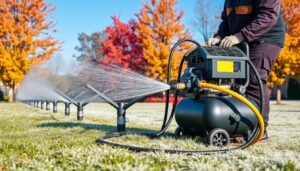Do you find it peculiar how your sprinklers seem to have a mind of their own, turning on at the most inconvenient times? It’s as if they have a secret agenda to keep your lawn watered whenever they please. But fear not! There are logical explanations for this mysterious behavior. In this article, we will delve into the various reasons why your sprinklers keep coming on without any apparent rhyme or reason.
One possible culprit could be a faulty timer or controller. These devices are responsible for regulating when and how long your sprinklers operate. If they are malfunctioning or outdated, it could result in erratic watering patterns.
Another potential cause is incorrect programming. Perhaps the settings on your timer or controller were accidentally adjusted, causing them to activate at unexpected intervals.
Furthermore, sensor malfunctions can also lead to unscheduled watering sessions. Sensors are designed to detect moisture levels in the soil and adjust irrigation accordingly. If these sensors become damaged or fail altogether, your sprinklers may turn on unnecessarily.
Stay tuned as we explore other common causes such as water pressure issues, leaking valves or pipes, electrical problems, obstructions in the sprinkler heads, seasonal adjustments, and the importance of regular maintenance and inspections. By understanding these factors, you’ll be equipped with the knowledge needed to regain control over your mischievous sprinkler system and ensure that it operates flawlessly when you need it most.
Faulty Timer or Controller
It’s likely that your sprinklers keep coming on because of a faulty timer or controller. This is a common troubleshooting issue that many homeowners face.
A faulty timer or controller can cause your sprinklers to turn on at unexpected times or not turn off at all, leading to wasted water and increased utility bills.
To determine if your timer or controller is indeed the problem, start by checking the display screen for any error messages or unusual settings. Make sure that all the wires and connections are secure and undamaged.
If everything appears to be in order, try resetting the timer or controller to its default settings.
If resetting doesn’t resolve the issue, you may need to consider replacing your timer or controller altogether. Look for alternative solutions that offer more advanced features and improved reliability. Some newer models even have smart technology capabilities, allowing you to control your sprinkler system from anywhere using a smartphone app.
Incorrect programming is another possible explanation for why your sprinklers keep coming on unexpectedly. Let’s explore this further in the next section about ‘incorrect programming’.
Incorrect Programming
The sprinklers’ frequent activation is likely due to incorrect programming, similar to a clock that consistently runs five minutes fast. When setting up the watering schedule on your sprinkler system’s controller, it’s essential to ensure that each zone’s run times are accurately programmed.
If the run times are set too long or too short, the sprinklers may activate more frequently than necessary. Additionally, double-check that the days and times for each zone are correctly inputted into the system.
Another common mistake in programming is forgetting to disable or adjust the manual override feature. This feature allows you to manually activate your sprinklers outside of their scheduled watering times. If this option is left enabled or used improperly, it can cause unnecessary activations.
To avoid these issues, carefully review and update your programming settings on your sprinkler system’s controller. Take note of any discrepancies or inconsistencies and make the necessary adjustments. By ensuring correct programming, you can prevent excessive water usage and keep your landscape adequately irrigated.
Moving forward, if addressing these programming concerns doesn’t resolve the issue of your sprinklers frequently coming on, it may be time to look into potential sensor malfunctions as a possible cause for this behavior without skipping a beat.
Sensor Malfunction
If your sprinklers are constantly going off, it could be because of a funky sensor. Sensor malfunctions can cause your sprinklers to turn on at inappropriate times or not turn off when they should.
One possible issue is sensor calibration. Over time, sensors can become misaligned or inaccurate, leading to incorrect readings and improper watering schedules. This can result in unnecessary water usage and higher bills.
Another factor that can affect the performance of your sprinkler system is weather interference. Extreme temperatures, heavy rain, or even strong winds can interfere with the functionality of your sensors, causing them to malfunction and trigger the sprinklers unexpectedly.
To address this problem, you should start by checking the calibration of your sensors. Make sure they are properly aligned and adjusted according to the manufacturer’s instructions. If necessary, recalibrate them to ensure accurate readings. Additionally, consider installing weather-resistant covers for your sensors to protect them from extreme weather conditions.
Now let’s move on to water pressure issues and how they can impact the operation of your sprinkler system without skipping a beat.
Water Pressure Issues
To prevent water pressure issues from affecting your sprinkler system, you need to ensure that the pressure is within the optimal range, typically between 40 and 60 pounds per square inch (psi).
Low water pressure can lead to inadequate coverage and reduced efficiency of your sprinklers. Here are five important things to consider:
- Check for any leaks or obstructions in the main water line leading to your sprinkler system.
- Inspect the water pressure regulator to ensure it’s functioning properly. This device helps maintain a consistent water pressure level.
- Clean or replace any clogged or damaged sprinkler heads that may be causing restricted water flow.
- Verify that the size of your pipes matches the required capacity for your system. Inadequate pipe size can result in decreased water pressure.
- Consider installing a booster pump if low water pressure persists, as it can help increase the overall pressure.
By addressing these potential issues with low water pressure, you can ensure that your sprinkler system operates at its best efficiency.
Now let’s transition into discussing another possible cause of malfunction: leaking valves or pipes.
Leaking Valves or Pipes
Addressing leaking valves or pipes is crucial for maintaining the efficiency of your sprinkler system and preventing any potential water wastage. Leaks can occur in both the valves and pipes of your sprinkler system, leading to water loss and reduced performance. Identifying and fixing these leaks is essential to ensure that your sprinklers only operate when necessary, saving you money on water bills and reducing unnecessary water consumption.
There are several common causes of leaking valves or pipes in a sprinkler system. One possible cause is wear and tear over time, which can result in cracks or holes forming in the valves or pipes. Another cause could be poor installation or improper maintenance, such as using low-quality materials or failing to tighten connections properly.
To troubleshoot leaking valves or pipes, start by visually inspecting all components of your sprinkler system for any signs of leaks. Look for wet spots, puddles, or damp areas around the valves and pipes. Additionally, listen for any hissing sounds that could indicate a leak.
Once you have identified a leak, you can use a table like the one below to help determine the best course of action:
| Issue | Possible Solution |
|---|---|
| Cracked valve | Replace valve |
| Hole in pipe | Patch or replace section of pipe |
| Loose connection | Tighten connection |
By addressing leaking valves or pipes promptly, you can prevent further damage to your sprinkler system and move on to troubleshooting potential issues with overwatering zones.
Overwatering Zones
Identifying overwatering zones in your sprinkler system is important to avoid excessive water usage and potential damage to your plants. It’s crucial to maintain proper soil moisture levels to ensure optimal plant health. Here are two key points to consider when assessing whether your sprinklers are overwatering certain areas:
- Check for excessively wet soil: Pay attention to areas where the soil is consistently damp or muddy, even long after the sprinklers have turned off. This could indicate that those zones are being overwatered, which can lead to root rot and other plant diseases.
- Monitor plant health: Look out for signs of overwatering such as wilting, yellowing leaves, or stunted growth. Overly saturated soil deprives plants of necessary oxygen and can cause their roots to suffocate.
By addressing these issues promptly, you can prevent unnecessary water waste and protect your plants from harm.
Moving forward into the next section on electrical problems, it’s essential to understand how they can also contribute to malfunctioning sprinkler systems without skipping a beat.
Electrical Problems
Amidst the lush greenery of your garden, electrical problems can sneak in like mischievous gremlins, causing havoc in the seamless operation of your sprinkler system. When it comes to troubleshooting tips for electrical issues with sprinklers, there are a few common causes that you should be aware of.
Firstly, check the power supply. Ensure that the circuit breaker or fuse controlling your sprinkler system isn’t tripped or blown. If it’s, reset or replace it accordingly.
Additionally, inspect the wiring connections from the controller to each zone valve and make sure they’re secure and intact.
Another potential culprit for electrical problems is faulty solenoid valves. These valves control the flow of water to each zone in your sprinkler system. Over time, solenoids can become worn out or damaged due to exposure to weather conditions or pests. Inspect these valves for any signs of wear and tear and replace them if necessary.
Lastly, consider any recent changes or additions made to your landscape that could be putting excessive strain on your system’s electrical capacity. Adding new lighting fixtures or other outdoor appliances may require an upgrade in wiring or transformer size.
Now that we’ve addressed common causes of electrical problems with sprinklers, let’s move on to discussing obstructions in the sprinkler heads without skipping a beat.
Obstructions in the Sprinkler Heads
In order to maintain the efficient operation of your sprinkler system, it’s crucial to be aware of any obstructions that may be affecting the performance of the sprinkler heads. One common issue that can cause your sprinklers to keep coming on is clogged nozzles. Over time, dirt, debris, and mineral deposits can accumulate in the nozzles, blocking the water flow and reducing their effectiveness. Regular inspection and cleaning of the nozzles can help prevent this problem.
Another factor to consider is your watering schedule. If you’ve set your sprinklers to come on too frequently or for too long a duration, it can lead to excessive water accumulation and potential damage to your lawn or garden. Adjusting your watering schedule based on factors such as weather conditions and soil moisture levels can help ensure that your sprinklers are operating optimally.
Now that we’ve addressed obstructions in the sprinkler heads, let’s move on to discuss seasonal adjustments. By making necessary changes according to seasonal variations such as temperature and rainfall patterns, you can ensure that your sprinkler system continues to work efficiently throughout the year without wasting water or causing any damage.
Seasonal Adjustments
If you’ve checked for obstructions in your sprinkler heads and they’re still coming on unexpectedly, another possible reason could be the seasonal adjustments. Your sprinkler system should be adjusted according to the changing seasons to ensure optimal performance and water conservation.
During the summer months, for example, you may need to increase the frequency and duration of watering to compensate for higher temperatures and increased evaporation. On the other hand, during cooler months, you might need to decrease watering times as plants require less moisture.
To make these seasonal adjustments effectively, it’s recommended to consult a professional sprinkler maintenance service. They have the expertise and knowledge to fine-tune your system based on local weather patterns and plant requirements.
By investing in professional sprinkler maintenance, you can not only save time but also benefit from water conservation tips that can help reduce water waste. Additionally, regular inspections by professionals will ensure that any potential issues with your system are addressed promptly before they escalate into costly repairs.
Now that we’ve covered seasonal adjustments, let’s move on to discussing the importance of regular maintenance and inspections in maintaining an efficient sprinkler system.
Regular Maintenance and Inspections
To maintain an efficient sprinkler system, it’s crucial to regularly inspect and maintain your equipment. Regular maintenance and inspections are essential for keeping your sprinklers running smoothly and preventing any potential issues that may arise.
By following a few simple steps, you can troubleshoot common problems in your irrigation system and ensure water conservation.
Start by checking for any leaks or broken sprinkler heads. Inspect the area around each sprinkler head for signs of water pooling or uneven spray patterns. If you notice any leaks or damage, replace the faulty parts immediately to prevent water waste.
Next, examine your controller settings. Adjust the watering schedule based on seasonal changes to avoid overwatering during cooler months and underwatering during hotter months. This will not only save water but also promote healthier plant growth.
Regularly clean the nozzles and filters to remove any debris that may clog them. Clogged nozzles can cause uneven watering, resulting in dry spots or areas with excessive moisture.
Lastly, consider installing rain sensors or smart controllers that automatically adjust watering schedules based on weather conditions. These devices can help conserve water by preventing unnecessary irrigation during rainy periods.
By performing regular maintenance and inspections, troubleshooting any issues promptly, and implementing water conservation tips, you can ensure that your sprinkler system operates efficiently while minimizing water waste.
Frequently Asked Questions
How do I fix a faulty timer or controller for my sprinklers?
To fix a faulty sprinkler timer or controller, start by checking the power supply and making sure it’s connected properly.
Then, inspect the wiring for any loose connections or damaged wires.
If everything looks fine, try resetting the timer or controller to its factory settings.
If the issue persists, consider replacing the timer or controller altogether.
Remember to consult the manufacturer’s manual for specific troubleshooting steps and always turn off the power before attempting any repairs.
What should I do if my sprinklers are overwatering certain zones?
If your sprinklers are overwatering certain zones, there are a few steps you can take to address the issue. Start by adjusting your watering schedule for those specific zones. This may involve reducing the frequency or duration of watering.
Additionally, troubleshooting water pressure can help ensure that each zone is receiving an appropriate amount of water. By making these adjustments, you can prevent overwatering and promote healthier plant growth in your lawn or garden.
How can I determine if there are obstructions in my sprinkler heads?
To determine if there are obstructions in your sprinkler heads, start by checking the water pressure. Low water pressure could indicate a blockage in the system.
Inspect the nozzles for debris or clogs and clean them if necessary.
Additionally, troubleshoot the solenoid valves to ensure they’re functioning properly.
Obstructions in the sprinkler heads can disrupt the flow of water and cause issues with their operation.
What are some common electrical problems that can cause sprinklers to come on unexpectedly?
If your sprinklers are unexpectedly turning on, it could be due to common electrical problems. One possible cause is a faulty timer or controller, which can trigger the system at odd times.
Another issue might be a short circuit in the wiring, causing the sprinkler valves to open randomly.
To troubleshoot these problems, check the timer settings and inspect the wiring for any damage or loose connections. If necessary, consult an electrician for further assistance.
What steps should I take to perform regular maintenance and inspections on my sprinkler system?
To perform regular maintenance and inspections on your sprinkler system, start by checking for signs of damage. Look for broken or leaking sprinkler heads, damaged pipes, or clogged nozzles.
Inspect the wiring connections to ensure they’re secure and free from corrosion. Test each zone to ensure proper functioning and adjust any misaligned sprinkler heads.
Regularly clean or replace filters to prevent clogs. By troubleshooting these issues proactively, you can keep your sprinkler system in optimal condition.

I’m Carlos Robert, a passionate gardener, and blogger. With years of experience and knowledge in the field of garden watering, I have created a blog to share my insights and tips on the topic. I strive to provide readers with detailed information about all aspects of sprinkler systems, from garden sprinklers to fire sprinklers, along with nozzles, hoses, and other related products. I love helping my readers create the perfect garden with their ideal setup!

